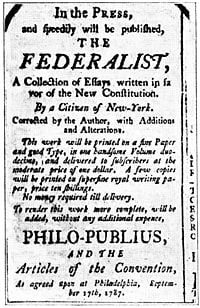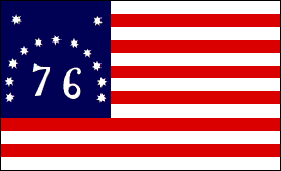The Federalist Papers are a series of 85 articles arguing for the ratification of the United States Constitution. They were first published serially from October 1787 to August 1788 in New York City newspapers. A compilation, called The Federalist, was published in 1788. The Federalist Papers serve as a primary source for interpretation of the Constitution, as they outline the philosophy and motivation of the proposed system of government. The authors of the Federalist Papers also used the opportunity to interpret certain provisions of the constitution to (i) influence the vote on ratification and (ii) influence future interpretations of the provisions in question.
The Avalon Project-Documents in Law, History & Diplomacy
The Avalon Project will mount digital documents relevant to the fields of Law, History, Economics, Politics, Diplomacy and Government. We do not intend to mount only static text but rather to add value to the text by linking to supporting documents expressly referred to in the body of the text.
Primary Documents in American History
The Library of Congress is home to many of the most important documents in American history. This Web site provides links to materials digitized from the collections of the Library of Congress that supplement and enhance the study of these crucial documents.
The links at right highlight eras of American History. Each of these sections link to a list of important documents from that era. For each item on these lists there is a page with background information about the document, a list of links to digital materials concerning that document from the Library’s site and elsewhere, and bibliographies both for general readers and for younger readers
American Council on Science and Health (ACSH)
The American Council on Science and health was founded in 1978 by a group of scientists who had become concerned that many important public policies related to health and the environment did not have a sound scientific basis. These scientists created the organization to add reason and balance to debates about public health issues and to bring common sense views to the public.ACSH is a national, non-profit, tax-exempt 501(c)(3) consumer health education and advocacy organization based in New York City.
ACSH’s mission is to ensure that peer-reviewed mainstream science reaches the public, the media, and the decision-makers who determine public policy. Our objective is to restore science and common sense to personal and public health decisions, in order to foster a scientifically sound and sensible public health policy for the American people. ACSH is committed to improving communication and dialogue between the scientific/medical community and the public and the media, in an effort to ensure that the coverage of health issues is based on scientific facts – not hyperbole, emotion and ideology.
Discover The Networks.org
The David Horowitz Freedom Center (DHFC) is dedicated to the defense of free societies whose moral, cultural and economic foundations are under attack by enemies both secular and religious, at home and abroad.
U.S. Historical Documents-A Chronology
The Magna Carta
1215: JOHN, by the grace of God King of England, Lord of Ireland, Duke of Normandy and Aquitaine, and Count of Anjou, to his archbishops, bishops, abbots, earls, barons, justices, foresters, sheriffs, stewards, servants, and to all his officials and loyal subjects, Greeting.
KNOW THAT BEFORE GOD, for the health of our soul and those of our ancestors and heirs, to the honour of God, the exaltation of the holy Church, and the better ordering of our kingdom, at the advice of our reverend fathers Stephen, archbishop of Canterbury, primate of all England, and cardinal of the holy Roman Church, Henry archbishop of Dublin, William bishop of London, Peter bishop of Winchester, Jocelin bishop of Bath and Glastonbury, Hugh bishop of Lincoln, Walter Bishop of Worcester, William bishop of Coventry, Benedict bishop of Rochester, Master Pandulf subdeacon and member of the papal household, Brother Aymeric master of the knighthood of the Temple in England, William Marshal earl of Pembroke, William earl of Salisbury, William earl of Warren, William earl of Arundel, Alan de Galloway constable of Scotland, Warin Fitz Gerald, Peter Fitz Herbert, Hubert de Burgh seneschal of Poitou, Hugh de Neville, Matthew Fitz Herbert, Thomas Basset, Alan Basset, Philip Daubeny, Robert de Roppeley, John Marshal, John Fitz Hugh, and other loyal subjects:
Cliches of Socialism
When a devotee of private property, free market, limited government principles states his position, he is inevitably confronted with a barrage of socialistic cliches. Failure to answer these has effectively silenced many a spokesman for freedom. Here are suggested answers to some of the most persistent of the “Cliches of Socialism.” These are not the only answers or even the best possible answers; but they may help someone else develop better explanations of the ideas on liberty that are the only effective displacement for the empty promises of socialism. Single-sheet reprints of each answer available at cost. Unless otherwise indicated, books noted in this volume are published by and available from the Foundation for Economic Education
Liberty Fund
Liberty Fund, Inc. is a private, educational foundation established to encourage the study of the ideal of a society of free and responsible individuals. The Foundation develops, supervises, and finances its own educational activities to foster thought and encourage discourse on enduring issues pertaining to liberty.







